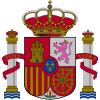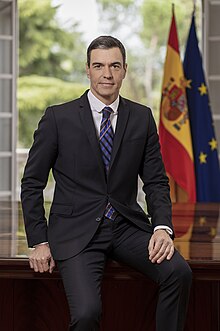| Prime Minister of Spain | |
|---|---|
| Presidente del Gobierno de España | |
 | |
since 2 June 2018 | |
| Government of Spain Office of the Prime Minister | |
| Style | The Most Excellent |
| Type | Head of government |
| Member of | |
| Reports to | Monarch Cortes Generales |
| Residence | Palace of Moncloa |
| Seat | Madrid, Spain |
| Nominator | The Congress of Deputies |
| Appointer | The Monarch |
| Term length | No fixed term |
| Deputy | Deputy Prime Minister |
| Salary | €90,000 per annum[1] |
| Website | lamoncloa |
 |
|---|
The prime minister of Spain, officially president of the Government[2] (Spanish: Presidente del Gobierno), is the head of government of Spain. The prime minister nominates the ministers and chairs the Council of Ministers. In this sense, the prime minister establishes the Government policies and coordinates the actions of the Cabinet members. As chief executive, the prime minister also advises the monarch on the exercise of their royal prerogatives.
Although it is not possible to determine when the position actually originated, the office of prime minister has evolved throughout history to what it is today. The role of prime minister (then called Secretary of State) as president of the Council of Ministers, first appears in a royal decree of 1824 by King Ferdinand VII.[3] The current office was established during the reign of Juan Carlos I, in the 1978 Constitution, which describes the prime minister's constitutional role and powers, how the prime minister accedes to, and is removed from office, and the relationship between the prime minister and Parliament.
Upon a vacancy, the monarch nominates a candidate for a vote of confidence by the Congress of Deputies, the lower house of the Cortes Generales. The process is a parliamentary investiture by which the head of government is elected by the Congress of Deputies. In practice, the prime minister is almost always the leader of the largest party in the Congress, although not necessarily. The prime minister's official residence and office is Moncloa Palace in Madrid.[4]
Pedro Sánchez, of the Spanish Socialist Workers' Party (PSOE), has been prime minister since 2 June 2018. He first came to power after a successful motion of no confidence against former prime minister Mariano Rajoy.[5] Since then, Sánchez has led three governments, the most—along with Adolfo Suárez—just behind fellow socialist Felipe González, prime minister from 1982 to 1996.[6] King Felipe VI re-appointed Sánchez for the third time on 17 November 2023[7] after he reached a coalition agreement with Sumar and gathered the support of other minor parties.[8] His third government took office on 21 November 2023.[9]
- ^ Carlos Molina (7 October 2022). "Pedro Sánchez ganará 90.010 euros, 5.410 euros más que las tres vicepresidentas". El País (in Spanish). Prisa. Retrieved 29 November 2022.
- ^ "La Moncloa. Pedro Sánchez Pérez-Castejón, President of the Government of Spain [President/Biography]".
- ^ Escudero López, José Antonio (1972). "The creation of the Presidency of the Council of Ministers". History of Spanish Law Yearbook (in Spanish). XLII: 757–767.
{{cite journal}}: CS1 maint: date and year (link) - ^ Rodríguez, Jesús (20 April 2018). "Moncloa Confidential: A peek inside the Spanish PM's seat of power". EL PAÍS English. Retrieved 3 December 2023.
- ^ Jones, Sam (2 June 2018). "Pedro Sánchez sworn in as Spain's prime minister after no-confidence vote". The Observer. ISSN 0029-7712. Retrieved 3 December 2023.
- ^ 20minutos (18 November 2023). "Tres investiduras, dos elecciones ganadas, dos mociones... las cifras de un Sánchez que ya amenaza los récords de Felipe González". www.20minutos.es - Últimas Noticias (in Spanish). Retrieved 3 December 2023.
{{cite web}}: CS1 maint: numeric names: authors list (link) - ^ R, J. A. (17 November 2023). "Pedro Sánchez promete ante el Rey su tercer mandato como presidente del Gobierno". El País (in Spanish). Retrieved 3 December 2023.
- ^ "Spain's parliament confirms Pedro Sánchez as prime minister". POLITICO. 16 November 2023. Retrieved 3 December 2023.
- ^ CABALLERO, ÁLVARO (21 November 2023). "El Gobierno echa a andar con la toma de posesión de los ministros". RTVE.es (in Spanish). Retrieved 3 December 2023.
